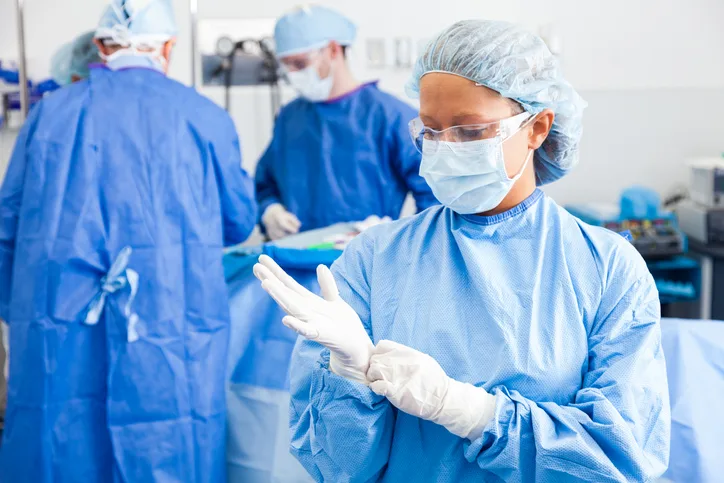
In the Literature
Brand KJ, Malek S, Ruple A, Hendrix GK. Evaluation of surgical gown cuff contamination during orthopaedic surgery in a veterinary teaching hospital. Vet Comp Orthop Traumatol. 2023;36(1):21-28. doi:10.1055/s-0042-1756621
The Research …
Surgical site infections in veterinary medicine can be complex and caused by a variety of factors (eg, surgeon, operating room, patient variables).
This study examined the influence of surgical gown cuffs, usually composed of loosely woven material, on potential bacterial contamination during orthopedic surgery. Surgical gown cuffs worn by surgical team members (ie, 1 boarded surgeon, 3 surgery residents, and 6 students) were cultured before and at the end of 10 orthopedic surgeries. Cultures were positive in 41.6% of samples both before and at the end of surgery. Isolated bacterial species were primarily Staphylococcus spp, Corynebacterium spp, and Streptococcus spp, which are considered normal human skin flora. No difference in proportion of positive cultures was noted among the surgeon, residents, or students, and no difference was noted between preoperative scrubbing of hands and arms with chlorhexidine soap and water and use of an alcohol-based hand rub.
Higher operating room humidity significantly increased likelihood of a positive culture, presumably due to increased skin perspiration wicking normal skin flora through the cuff. An increased number of individuals scrubbed in during surgery lowered the chances of bacterial growth; this result was unexpected but could be explained by increased surgical assistance reducing risk for contamination or, less likely, decreased physical effort leading to reduced perspiration.
Based on this study, the potential for bacterial contamination from surgical gown cuffs is significant and should be considered when donning and changing gloves. Surgical gloves should fully cover the cuff of the gown.
… The Takeaways
Key pearls to put into practice:
The surgical gown cuff may allow skin bacteria from surgical team members to enter the surgical field.
Operating room humidity should be kept low to reduce perspiration that can wick skin bacteria through the cuff.
Clinical infections in dogs during this study were rare despite positive results in 41.6% of bacterial cultures.
You are reading 2-Minute Takeaways, a research summary resource proudly presented by Clinician’s Brief. Clinician’s Brief does not conduct primary research.